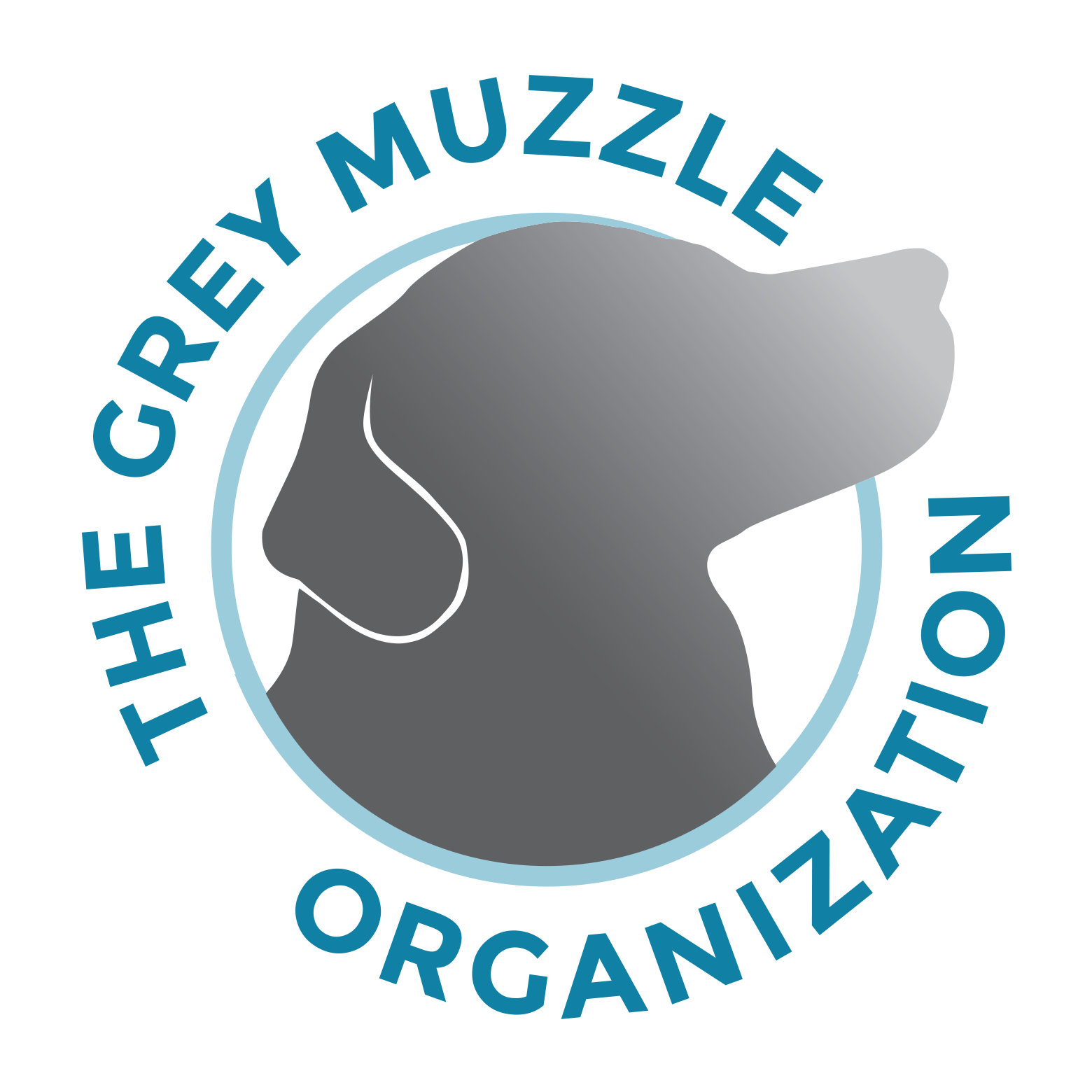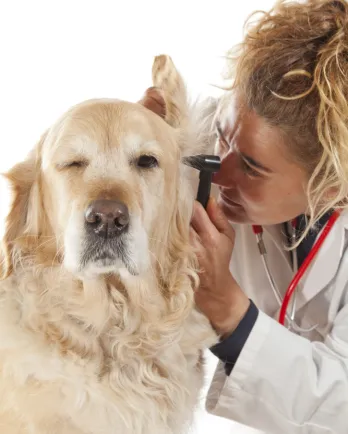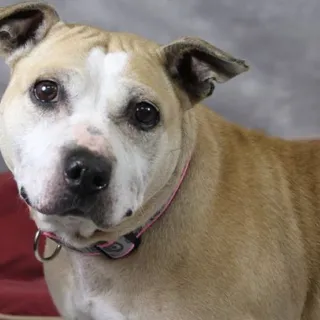Insomnia in Senior Dogs by Dr. Julie Buzby, DVM
Dr. Julie Buzby, DVM, a member of Grey Muzzle's Advisory Board, is a practicing integrative veterinarian and the developer of ToeGrips®, devices that improve mobility in dogs by providing them with better traction. She has published numerous articles on canine health and wellness, and has a new blog, The Buzby Bark.
A couple of years ago, a gentleman came to me as a new client asking me to acupuncture his geriatric dog who frequently paced and barked at night. Though acupuncture can be helpful for dogs with sleep-wake cycle disturbances, I had never been asked this before. Hearing his story, I certainly developed a more acute sympathy for dogs who exhibit these symptoms and the people who love them, because both suffer.
The gentleman described his wife—the dog’s caretaker—as on the verge of a nervous breakdown. Like many moms, she was a light sleeper. At night, she would awaken when the dog began panting and pacing. She got up and tried to settle him by taking him outside, offering water, turning on a fan, moving to other rooms in the home, but nothing helped. The nighttime ritual had to run its course until the exhausted dog and woman fell asleep in the early morning hours.
I know this is not an isolated case. Restlessness, panting, pacing, and vocalization at bedtime (and overnight) is not uncommon in senior dogs. There are dozens of reasons why this occurs, and getting to the root cause can seem impossible, especially if there are multiple contributing factors. However, through a careful physical exam and with a “wholistic" approach, restful nights can be a reality.
Making a Diagnosis
It can be difficult to distinguish between a cognitive disorder, a behavioral problem, a medical malady, and a combination of causes, so to make a diagnosis, your veterinarian will talk with you about your dog’s symptoms, conduct a thorough physical exam, and do lab work.
What to expect at your veterinary visit:
- An Interview. Your veterinarian (or veterinary technician) will take detailed notes, called a history, on what is happening with your dog. You can help by being prepared with information. Start a journal now. Chronicle what occurs and when. Are there symptoms during the day? Have you identified triggers? Are there factors that make the situation better or worse? These observations will be important as you convey the story to your vet, but also as you compare future nights and look for changes and improvement.
- The physical examination. It is critical that your veterinarian takes time to do a thorough head-to-tail examination on your dog.
- Lab work. Blood tests will likely be performed, as well as a urinalysis.
Why Does Insomnia Occur in Senior Dogs?
Canine Cognitive Dysfunction Syndrome: One possible cause is Canine Cognitive Dysfunction Syndrome (CCDS). It is often first noted by owners as unusual behavioral changes. Cognitive dysfunction refers to abnormal changes in memory and awareness, which is often perceived by the dog’s family as doggie senility. Dogs suffering from this syndrome may change the way they relate to their humans (becoming less responsive), seem to forget training they had previously mastered (having accidents in the house), appear confused or disoriented (getting stuck in corners of the home), and can experience a change in established normal sleep-wake patterns, often increasing nocturnal activity.
In humans with Alzheimer’s disease, a syndrome called “sundowning” is described. This occurs in about 20% of people with dementia. These individuals become more confused and agitated at night. It seems dogs can exhibit the same pattern.
Pain: If there are no signs of cognitive loss, pain is probably the most common reason for senior dogs to exhibit nighttime distress. A careful exam coupled with your input, should bring pain to light. Musculoskeletal pain is a common culprit, as well as neurogenic pain—pain stemming from the nerves.
Sometimes pain is not obvious and a veterinarian will recommend a trial on pain medications to see if there is improvement. One veterinarian tells the story of a new client at her wit’s end with her senior Border Collie, who would pace incessantly at night. The vet was a third opinion exam and the owner was considering euthanasia. Though the dog didn’t exhibit signs of discomfort, the vet prescribed a combination of two pain medications. The dog was “cured,” to the delight of all involved. Apparently, this older dog was suffering from chronic pain, which escalated at night.
Other diagnoses that can be made (or suspected) from lab results:
- Hypothyroidism
- Diabetes
- Cushing’s Syndrome
- Urinary tract infection
Though not an exclusive list, all of the above could cause a dog to be restless at night. Hypothyroidism and diabetes would flag in the lab work, and there would likely be indicators in the results which would lead a veterinarian to pursue further testing for Cushing’s (hyperadrenocorticism).
A urinary tract infection may be more difficult to detect. If the urine is dilute, which is common with seniors, a urinary tract infection may be missed. A urine culture on a sample obtained via cystocentesis (aspirated by a needle in the bladder) is the gold standard for diagnosis and may be recommended as part of follow up.
Intracranial disease: Another category of disease which can cause these types of symptoms is referred to as “intracranial disease”, meaning pathology in the central nervous system, such as a brain tumor or other inflammatory brain disease. Diagnosis requires an MRI or CT scan, which are typically done at a vet school or referral center.
Options for Helping Your Dog
If your dog is exhibiting these symptoms, please know that help is available. Because diagnosis can be tricky, I won’t promise that you’ll find the complete answer on your first vet visit, but after a thorough physical exam and lab work, your veterinarian will be able to rule in and rule out many diagnoses.
Your veterinarian will likely prescribe medications/supplements based on your dog’s history and results. Specifically, it would depend on the diagnosis, but here are some things that your vet may recommend—
- Hill’s Prescription Diet b/d (Although I don't prescribe this brand myself, I have heard of many “miracles” related to this specific diet.)
- Increasing exercise and mental stimulation during the daytime
- Antioxidants
- Omega-3 Fatty Acids
- SAMe
- Adaptil collar (contains dog-appeasing pheromone)
- Acupuncture
- Melatonin
- Specific medication for CCDS
- Pain medications
- Anxiety medications
- Seizure medication
Now What?
If you can identify with the exhausted owners in this article, please contact your veterinarian.
It’s important to follow your vet’s recommendations carefully, as incorrect drug/supplement combinations can cause harm.
There may be some trial and error, and good days and bad days, but I am optimistic that you and your dog can have restful nights in your future!
Dr. Julie Buzby, DVM has published numerous articles on canine health and wellness. You can read more articles by her on Grey Matters.
The information presented by The Grey Muzzle Organization is for informational purposes only. Readers are urged to consult with a licensed veterinarian for issues relating to their own pet's health or well-being or prior to implementing any treatment.
The Grey Muzzle Organization improves the lives of at-risk senior dogs by providing funding and resources to animal shelters, rescue organizations, sanctuaries, and other nonprofit groups nationwide.



